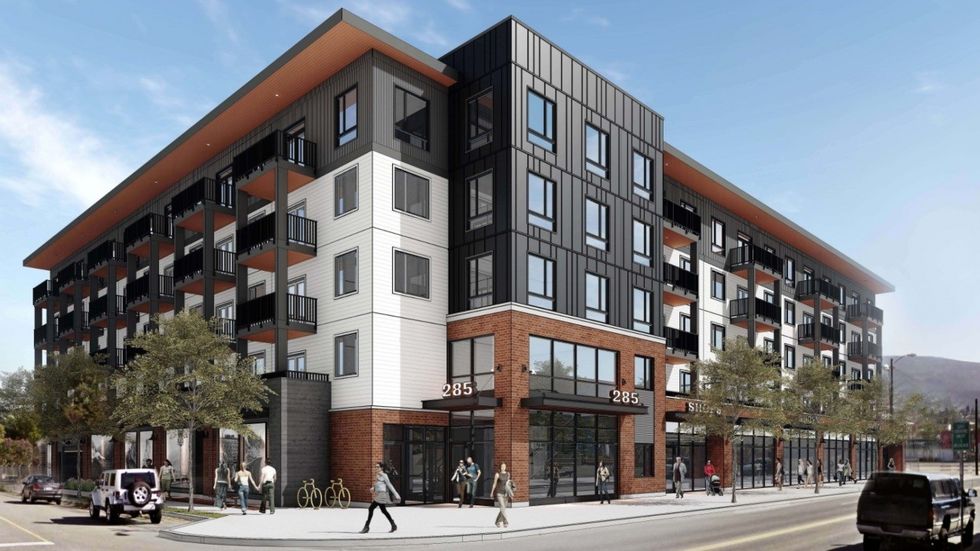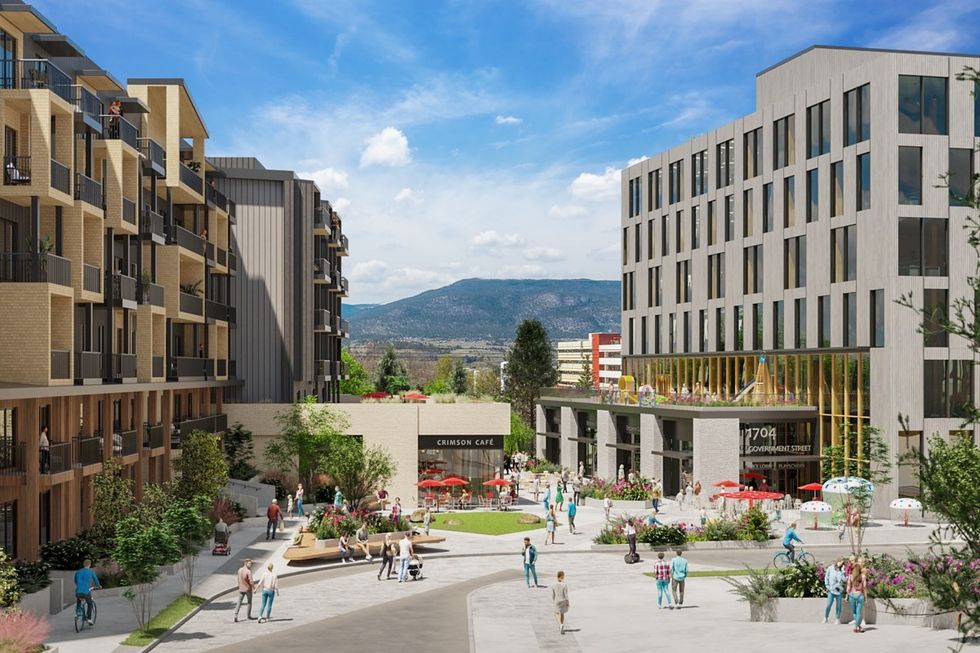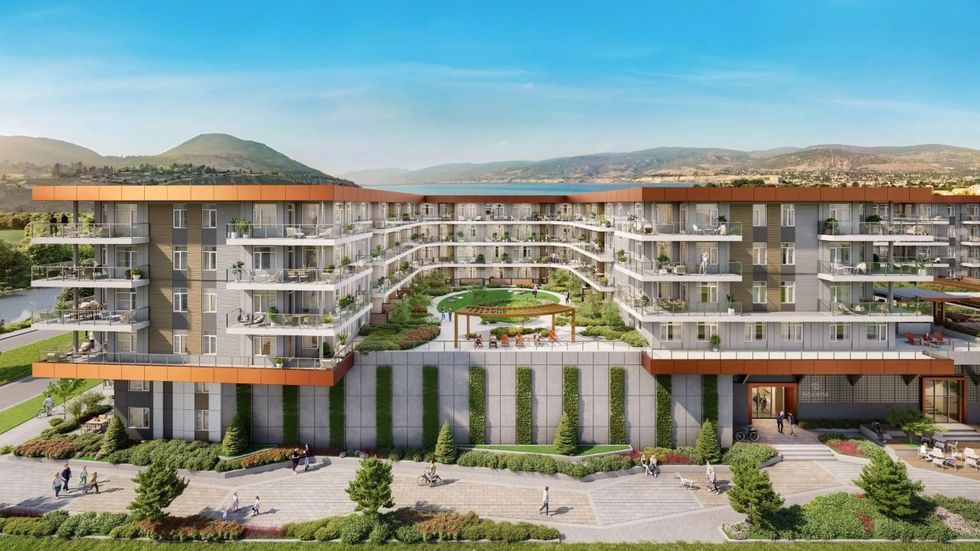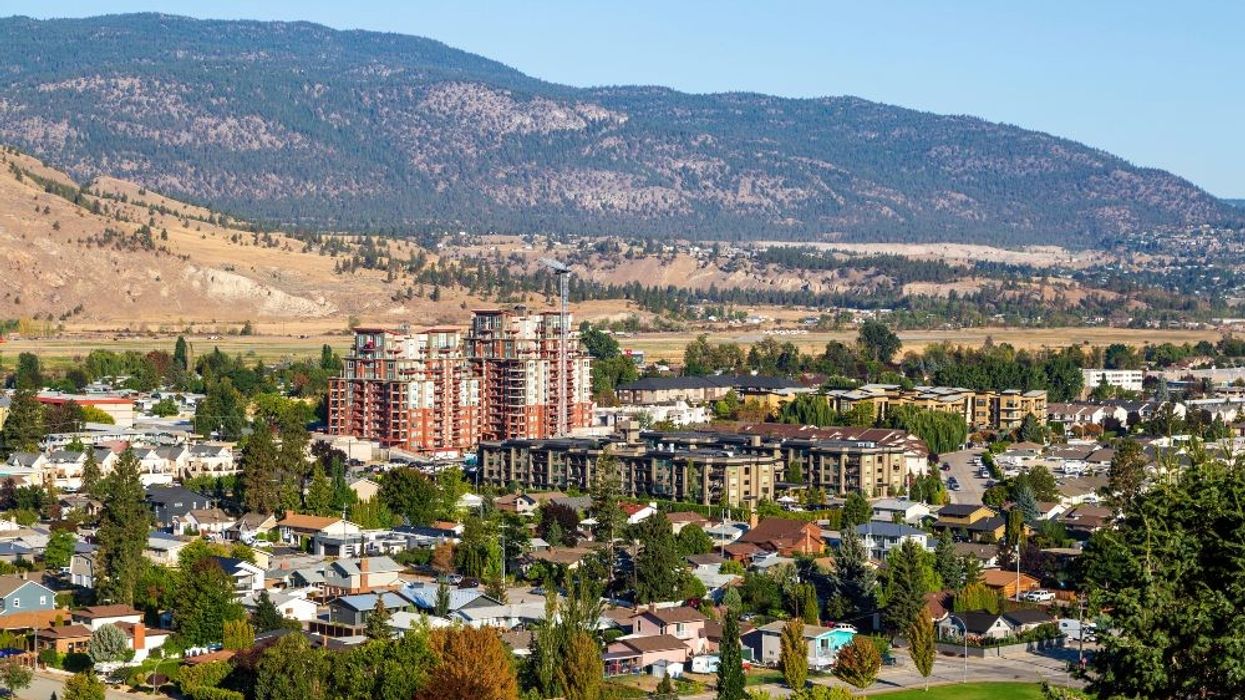This time last year, STOREYS spoke to several members of Kelowna's real estate industry to get their on-the-ground experiences of watching Kelowna put itself on the map, becoming one of the fastest-growing cities not just in British Columbia, but all of Canada.
The Okanagan Valley, however, is home to numerous other scenic cities, and when asked to identify the next city in the region to watch out for, those interviewed all pointed to the same place: Penticton.
Located about an hour drive south of Kelowna, Penticton is one of just two cities in the world that is situated between two lakes — Okanagan Lake to the north, Skaha Lake to the south. It's name, according to the City, comes from the Interior Salish word "snpintktn," which translates to something between "a place where people live year-round" and "a place to stay forever."
That’s becoming more and more true, as the advent of remote work has cut many of the strings tying people to one particular workplace, allowing them to live where they want. Meanwhile, cities that have the merits stand to benefit.
For Penticton, those merits include access to the aforementioned dual lakes, wonderful outdoor recreation, proximity to wineries and breweries, and a growing cultural scene. These are qualities that many find appealing, and if there's one truth that can be said of every developer, it's that they follow demand and go where they see people going. Here's what else they're seeing.
Penticton vs. Kelowna
A reasonable question to ask, considering their nearness, is how different is Penticton from Kelowna?
"It has that proximity to Kelowna, but on a smaller scale," said Luke Turri, President of Mission Group, a prominent developer in Kelowna that recently completed their first project in Penticton, located at 285 Westminster Avenue W. "It has a small-town feel, but in a lot of ways it has world-class amenities. The access to wine country in Penticton is even better than it is in Kelowna, it's got a lake on either end of town, the food scene is growing, the brewery scene is growing, and that's why we think Penticton is a great spot."
A key appeal of Penticton at this particular moment in time, those interviewed by STOREYS said, is that it's still a bit of a hidden gem, whereas Kelowna has now become widely-known.

"Penticton is still a relatively small market," said Turri. "We don't see it becoming Kelowna. But, for many, that's kind of what sets it apart and what's special about it. And it's moving from a place where retirees and visitors want to be, to more of an urban market. Not a big city market. It doesn't want to be a big city market, in some regards. But more of a mature market that people can see themselves investing in."
"I think the growth is a bit different in Penticton in the sense that Kelowna has been growing because of UBC and the airport, which has driven up the cost of real estate and has made it quite busy," added Leonard Kerkhoff, President & CEO of Kerkhoff Develop-Build, another prominent Kelowna developer now operating in Penticton. "People going to Penticton are looking for more of a quieter life."
"Vancouver, Calgary, and Toronto are very expensive markets now, so a lot of transit is happening out of those cities and into areas in the Okanagan Valley," he added. "They are more cost-effective and are a more desirable place to live, so I see that continuing to happen. It's really opened up the Okanagan Valley. There's no reason for it not to."
The Demographics and Housing Needs
Like pretty much every other population centre in our country, Penticton is in need of more housing. The rental market has around a 1.5% vacancy rate, which is way too low, Kerkhoff said. Two notable demographics are people above the age of 65 and people who work in healthcare, while the demographic of young adults is also growing.
"If you go through the Penticton housing needs assessment, you'll definitely see the population percentages for 65+ is a significant portion of the population, so I see that continuing to be a big driver," said Kerkhoff. "That requires more accessible and adaptable-type product. Single-family homes aren't ideal for the aging population. Downtown core developments that are multi-family, that have the elevators, that are walkable, lock-and-leave — it's much more convenient."
"Twelve years ago, the Province spent $800 million expanding the hospital, without investing anything in housing, and that put immense pressure on housing, and that's helped fuel housing costs in Kelowna," said Rocky Sethi, Managing Director of Stryke Group, a Vancouver-based developer that's currently undertaking the largest development in Penticton, the Innovation District, along with Tien Sher Group. "Now the City of Penticton and Penticton Regional Hospital is in the middle of a $400 million expansion, also with little investment in housing."

The Innovation District project is set for a 10-acre parcel neighbouring both Interior Health and Penticton Regional Hospital, and much of the project is catering to that demographic, whether it be providing clinic space, cafes, childcare facilities, or housing for medical workers.
"The fact that you've got a major employer like Interior Health with a regional asset there, the hospital, it's a big driver of employment," said Sethi. "Add into that changing demographics, people moving out of Vancouver and Alberta looking to relocate to the Okanagan for the lifestyle. One interesting thing is if you look at the housing needs assessment from last year, a notable part of the buyer group that's moving into Penticton is trending on the younger side. That's been true with our development. We've seen our demographic of buyers skew towards the younger side, which we weren't entirely sure was going to happen. There's also people relocating to not be in a larger city like what Kelowna has become. No knock against Kelowna, because I have a home there, but Penticton gives that quintessential lifestyle that people are chasing and Kelowna has kind of outgrown."
Developing Penticton
All parties interviewed also said that the interest in Penticton among developers is strong, including some from Alberta.
"Interest is unusually strong among developers, which I think speaks to the demand, because developers are following the demand," said Sethi. "We recently did a big [Urban Development Institute] tour and I joked around with the Executive Director of the UDI and I said a couple years ago, the UDI didn't even know where Kelowna was and now they're all the way down in Penticton. It speaks to affordability and where the market is kind of going. There's definitely continued sustained growth for Penticton in the long run."
For Kerkhoff, their Sokana project located at 270 Riverside Drive made some headlines last year after selling out its first release of homes within 72 hours. Construction is now ongoing on Phase One, with work on Phase Two expected to begin in the coming months, and the project expected to deliver a total of 234 homes within the next two years.

"Originally, when we started look at it, the zoning allowed a mid-rise strata development," said Kerkhoff. "There was a plan for two towers at 15 storeys each. We were approached with the concept, because we were building towers in Kelowna. We took a look at it and underwrote it as a tower, but our feeling was that it would not be able to cover the cost of construction through the sales revenue in Penticton. Penticton revenues definitely are a bit a lower. It's a bit more cost-effective [for consumers] to buy in Penticton, compared to Kelowna, but unfortunately that doesn't cover the cost of construction. We then reimagined the project to be what it is today."
For Mission Group, their first Penticton project was a rental project and Turri says he sees more of Penticton in their future.
"We're very focused on investing in the Okanagan and a lot of our work to date has been in Kelowna, but we've been interested in the Penticton market for a few years," he added. "We were looking at long-term investment there, particularly in rental apartments, and we felt that there was a lack of urban, higher-end rental housing. When we found the 285 Westminster site, we found a perfect opportunity to take advantage of that gap in the market and deliver that type of housing."
The Policy Framework
A small thing that developers care about that doesn't always get discussed is the working relationship with local governments. By that measure, Penticton is doing very well, those interviewed said, and one of the major takeaways from the aforementioned UDI tour — during which Mission Group, Kerkhoff Develop-Build, and Stryke Group all showcased their aforementioned projects to attendees that included the Mayor and Council — was that Penticton is open for business.
"We have found Penticton City Hall to be great to deal with," said Turri, who was formerly an Urban Planner with the City of Kelowna. "Both staff and elected officials, including the Mayor and Council, are progressive and they're responsive. They see growth as an opportunity to improve the quality of life for their residents. They're still growing into some of the urban development processes — updating their bylaws, updating their planning documents — but anytime we've come up [to them] with a situation, they've been very responsive and easy to have a conversation with."
"They're generally quite good and proactive," added Sethi. "The way I say it is they start from 'How do we get to yes.' We may not get there the same way, but we all know we need to get to yes, we need to approve housing, so they've been a good group to deal with."
One of the subplots that continues to unfold in Penticton, as well as Kelowna, is the impact of the Province's new rules on short-term rentals, which were introduced last year and have caused a fair amount of consternation. All parties interviewed agreed that the Province should have taken a more delicate approach instead of forcing one policy onto all cities.
"A town like Penticton, which is very tourist-driven, it hurts the tourist sector big time," said Kerkhoff. "We've defintely noticed some impact on our sales program. An investor-purchaser buying these units will be looking at all options, whether it be long-term rent or short-term rent. They look for all ways to ensure their investment decision is sound, and this reduces that somewhat. The low vacancy rates and the growth of the city over the next five, 10, 15 years is still there to make sense to an investor, but it does raise some questions."
"We've certainly seen the tourism industry or business owners concerned about the tourism traffic this year," added Turri. "How much of that is specifically around short-term rentals is hard to measure, but we certainly continue to believe that a more tailored approach to the short-term rental legislation is needed for markets like Kelowna and Penticton. Certainly, the presale market is challenged at the moment. We feel that there is still a lot of pent-up demand, but because of where interest rates have been, and a variety of economic factors, there's a lot of inventory and not a lot of sales happening at this time. But we know that demand is going to be there, eventually."
In other words: Penticton, snpintktn.
- How The Kelowna Real Estate Market Put Itself On The Map ›
- Mission Group's 40-Storey Rental Tower In Kelowna Moves Forward ›





















